© Edm
Was there ever an age of peace? If there really was, the history books don’t appear to record it. Of course, that could be because times of bloody conflict make for more exciting reading and more interesting stories, but possibly fewer observers in a position to write anything down or record it. Looking back at the history of our trouble world, it could be because there’s never really been a time of peace, at least not for very long or over a wide enough area. There have been plenty of wars, of course, since the first recorded use of war chariots in around 2,400 BCE. It’s not as if people didn’t fight before then, or that armies didn’t clash, armed with sharp things. But it was less well organised, and it took longer to slaughter large enough numbers to matter much. Wars at sea are nothing new, either, with the first to be recorded having taken place in 56 BCE, with the navies of classical Rome and the Veneti Gauls coming to blows somewhere in the Atlantic. The Romans won that one, by the way. Of course, it was a long time ago, between powers that no longer exist as global entities. No details of acts of heroism are recorded, it seems, so the outcome is an irrelevance anyway. That is generally the case for most wars, which in any case could probably have been avoided with a little diplomacy.
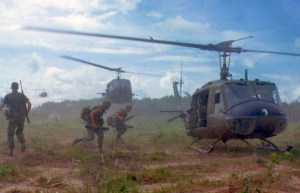
It was back in 1969 that the American singer Edwin Starr recorded “War (What is it Good For?)”, which was heard over and over again throughout the 1970s. It was mainly about the ongoing war in Vietnam, of course, but its message is still relevant today. There’s seldom been a shortage of wars to sing about, if you’re so inclined. Of course, for some people, war can be quite profitable. The big oil companies spring to mind, but they’re not the only ones to profit from wars. Indeed, it seems that quite a lot of people see little wrong in launching and then stoking conflicts that kill, although the people who make money out of such activities are seldom to be found anywhere near the front line. You’d be amazed (or possibly not) by how many people view warfare as something from which profit can be extracted. For those who would join a war, it has always been a way to build one’s reputation, as the playwright William Shakespeare put it in his list of what he called “the Seven Ages of Man”, in the play “As You Like It”. Many men seem to like dressing up in conflict gear as he steps from one phase of life to another, progressing from “the infant”, to “the whining schoolboy”, then “the lover” and so on and on: “Then a soldier; Full of strange oaths, and bearded like the pard, Jealous in honour, sudden and quick in quarrel. Seeking the bubble reputation Even in the canon’s mouth.” Bang.
If you search current conflicts online you’d be amazed at just how many there are going on as you sit reading this. Right at this moment, as you’re turning the page, somebody somewhere is copping a live military round, probably 7.62 mm, somewhere painful, and very possibly somewhere terminal. As for that quotation “Peace in Our Time”, it comes from a speech given by the then British Prime Minister, Neville Chamberlain, in 1939, just after holding talks with Hitler in Munich in a bid to avoid war. It was nonsense then and it still is. Just under a year after Chamberlain said it, Hitler’s invasion of Poland launched the Second World War. It was a misquote, too: in his speech he really spoke of “peace for our time”. Peace in Our Time is a line from a popular 7th century hymn, and is more of a prayer than an observation about an international peace conference, especially the 1938 Munich Accords.
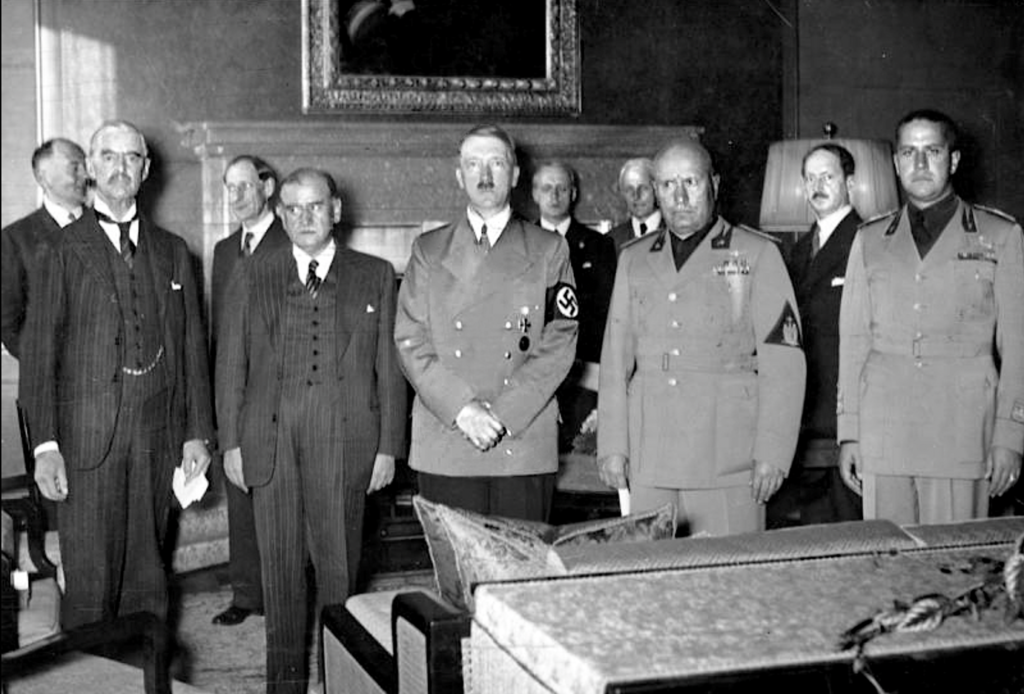
They did little except give Hitler more time to prepare for war, even if Chamberlain and others realised back then that they’d merely been unsuccessful in stopping an unhinged kleptomaniac leader from launching an attack on all those neighbours whose territory he coveted. And now it’s happening again, even if this time the unhinged kleptomaniac coveting other people’s territory lacks a silly moustache and baggy jodhpurs. We have to make do with a supercilious half-smile instead, intended to distract us from his wish to rule the world. If he did, of course, unlike that song, every day would NOT be the first day of Spring but more likely the last day of peaceful co-existence. Perhaps the “first day of the end of the world” is all we’re likely to see, accompanied I suppose by Putin’s manic laughter.
| MAKING MONEY OUT OF CONFLICT
Of course, there are always people who see a commercial opportunity in the business of dealing in arms. In the UK, questions are being asked about a Conservative MP, Mark
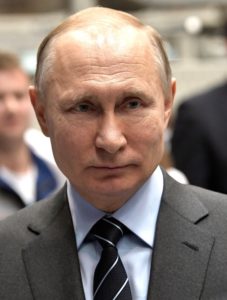
Pritchard over allegedly providing his expert services to a Macedonian company, ATS, trading in arms and developing new military equipment, some of it for law enforcement purposes. As he pointed out, however, that in itself is not illegal, even if you personally find it distasteful.
Even so, if you were under attack in the street, you’d expect the police to arrive with weapons they are able to use. According to the Open Democracy website, more than 210 members of the UK parliament receive incomes (permitted and declared) from non-parliamentary sources. In other words, they do some additional work on the side to boost their incomes, or – as it’s often called in certain quarters – “moonlighting”.
A bit of extra profit is one thing, but wars seldom leave everyone unscathed, even among those deeply engaged in fighting. In this most recent case, we see Putin’s Russia edging ever closer to war with no real obvious motivation. In fact, Putin has given a variety of different reasons for launching his attack on Ukraine. Of course, Ukraine was at one time a part of the Soviet Union (although never a part of Russia itself), which looked to Moscow for control and guidance until the Soviet Union’s collapse in December 1991, since when it has considered itself an independent country. Independence was the verdict of a referendum, although Putin still refers to it as being Russian and denies its nationhood. He even told former US President George W. Bush that Ukraine is not a real country. He never did take much notice of public opinion, however overwhelming. One commentator has alleged that many Russians see Kiev as “the mother of Russian” cities, which means it has to be inside Russia, even if that involves redrawing boundaries.
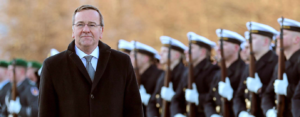
It was in Kiev many years ago that I saw lots of students dressed up as Disney characters and also where I bought from a street trader a roll of toilet paper with Putin’s face printed on every sheet. It seems that Ukrainians don’t like him and nor do they share his view that Ukraine is really Russian. Journalist Rachel Hall told Business Insider that: “Russia can’t claim a thousand years of history because Kyiv was already in existence 1,200 years ago, when Moscow was a forest.”
Hall also told the publication that: “Putin’s opinion has always been that Ukrainians and Russians are the same people, that they’re part of the Slavic Brotherhood of Russia, Belarus, and Ukraine.” It’s a view shared by quite a few Russians but hardly any Ukrainians, even if Belarus has handed itself to Moscow on a plate. Ukraine, however, has been an important economic asset to Russia for a very long time, supplying much of its coal and steel, and thus securing its economic wealth in the later years of the 19th century and after. But if Ukraine is a natural part of Russia, why was it so keen to break away? According to Putin’s narrative, “Russia has a right to rule Ukraine. Russians and Ukrainians are one nation and one people.” He clearly doesn’t think the Ukrainians should have a say in that and he blames the West for the current impasse, because NATO’s borders were stretching ever closer to Russia’s. But even if that excuses had a founding in reality it would be a very poor excuse for what Russia has been doing in Ukraine.
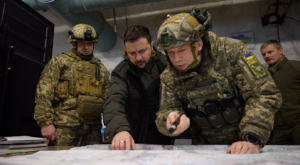
Putin has made the claim that Ukraine is run by Nazis, even though its President, Volodymyr Zelenskyy, is Jewish. What the Nazis did in horrible places like Auschwitz deeply shocked the Russian troops who liberated it, although they were, of course, committed Communists. Whoever is now involved in running Ukraine, it certainly isn’t Nazis. One expert wrote that Putin’s anxiety revolves around this question: “Am I going to be a footnote in Russian history or are they going to write books about me like they do Peter the Great, Catherine the Great, Stalin.” The ones written about Stalin are hardly flattering, mind you, although the one written by Oleg V. Khlevniuk and simply called “Stalin – New Biography of a Dictator” is excellent. Is that really how Putin wants people to remember him? Wouldn’t he prefer to be remembered like Vlad the Impaler, or Dracula? As for the timing of the Russian invasion, in February 2022, it seems that Putin took the decision because he thought that Zelenskyy, being an actor and TV comic, would be easy to manipulate. That, clearly, was a very silly mistake. It seems Putin truly believed that Russia would conquer Ukraine in a matter of days. Another mistake. Indeed, some experts have suggested that Putin suffers from megalomania, exacerbated by his relative isolation in global politics. He certainly hasn’t enhanced his popularity. When the defence ministers of the Baltic states – Latvia, Lithuania and Estonia, met in Riga in January, they signed an agreement to set up a joint “Baltic Defence Line” to strengthen their eastern borders, not only of their own countries but also of the European Union and NATO. They don’t favour a visit from Putin’s forces, whatever he may think.
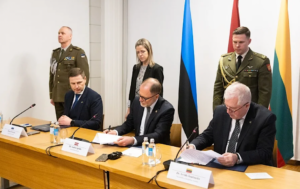
Another thing that’s likely to annoy the man in the Kremlin is the Ukrainian taste for laughter. Zelenskyy, we must recall, was a comedian before he took on the unenviable task of running the country, and stand-up comedy is now all the rage there, while an earlier taste for Russian humour has faded away. From very little interest before the invasion, Ukraine’s comics now perform to audiences of 1,500 or more. The performances now tend to be in the Ukrainian language, rather than Russian, as used to be the trend. The Economist magazine quotes one Ukrainian comedian, Vasyl Byduck, as saying: “Comedians are like rats: we survive any disaster and are the first to emerge from tragedy.” As for the choice of subjects, that’s not a problem either. “I don’t think a dead Russian is OK,” said comedienne Nastya Zukhvala, “I think a dead Russian is very good, actually.” Yes, it’s “black humour”, but having invaded the country with the intention of taking it over, Putin can hardly be surprised.
| GIMME, GIMME, GIMME
Meanwhile – perhaps unsurprisingly – Russia continually tries to point the finger at the West. The Russian military magazine Mobilization News quotes official Russian sources as saying that a deadly attack on Donetsk (situated in Ukraine but under Russian control) involved the use of Western, NATO-made weapons. Few people believe it; Putin’s reputation for lying is considerable. Meanwhile, the publication also claims that new recruits to Russia’s rag-tag army are being mistreated by their commanders at a training ground in Volgograd Oblast, including beatings and a lack of adequate protection against freezing weather.
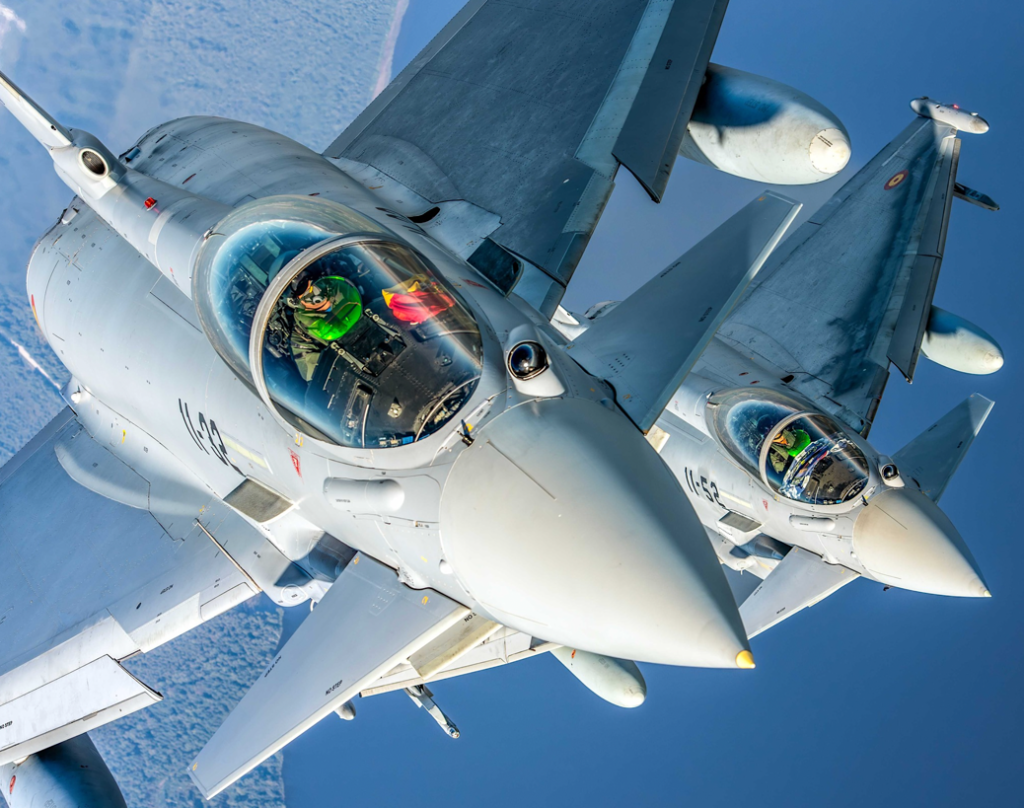
The newly-conscripted Russian troops are reportedly being forced to purchase their own uniforms and sleeping in unheated tents. Young men dragooned unwillingly into fighting are seldom treated well, and it’s been reported that Russia is losing more soldiers than it can compensate for through conscription. It’s now reckoned that the number of casualties on both sides comes to more than half a million. That’s a half a million lives lost just to satisfy Putin’s vanity.
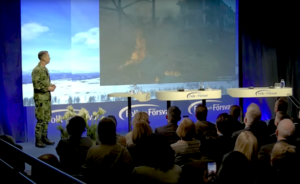
America’s Council on Foreign Relations (CFR) points out that Russia is continuing to shell and bomb Ukrainian cities, as well as blockading its ports, while Ukraine has stepped up drone attacks on Russian ships and installations. Ukraine has received some $350-million (€321.28-million) in aid to help it repel the unprovoked Russian attack, which includes $77-million (€70.7-million) from Washington, although there are growing fears of “donor fatigue” that must make Putin smile. Fighting, which includes air strikes, has inflicted almost 22,000 civilian casualties, according to CFR, with some 5.1-million people internally displaced and 6.2-million people having fled the country.
It would be very unwise to underestimate Russian firepower. Back in 2021, Russia climbed from being the fifth biggest spender on military equipment to being the third biggest. It seems that Russia (or at least Putin, which is not necessarily the same thing) really likes going to war. We should not forget how Stalin took a decision to “Sovietize” and absorb his neighbours, adding to the territory over which he had gained influence under the Molotov-Ribbentrop pact, apparently believing it would prevent attacks on Russian territory via that route.
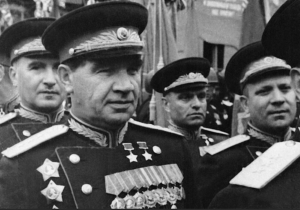
He tried not to annoy France or Britain too much, but his army group commander Vasily Chuilkov, still exultant over his army’s rapid victory in Poland, then boasted in a radio interview, that his troops could easily take Berlin. Stalin was furious, although it became illegal in the Soviet Union to criticise Hitler or the Nazis. In 1939, Stalin decided to invade Finland (a small neighbouring country without much firepower; sound familiar?). Stalin insisted on placing a Soviet military base there and on taking a large area of Finnish territory not far from Leningrad. Finland, which had won its independence in 1917, was suspicious of Russia’s imperialist ambitions.
The Red Army invaded Finland in 1939, expecting a quick and easy victory (once again, it makes the invasion of Ukraine resemble a replay). Finland was tiny, with just 4-million inhabitants and when the “Winter War” as it became known, began, it had just 26 tanks with which to repel the USSR’s 1,500. Stalin was convinced it would all be over in a trice, but Finland fought back hard and well and other nations around the world increasingly took its side. As it turned out, Finland did lose quite a lot of its territory but the USSR was expelled from the League of Nations, while France and Britain prepared to intervene. The Red Army lost some 130,000 troops. What made it worse was that Hitler was enjoying extraordinary success in Germany’s invasions, including forcing France to capitulate in just a matter of weeks. Russia did, however, gain control of Latvia, Lithuania and Estonia, along with Bessarabia and part of Bukovina, snatched from Romania. So there we have the almost-perfect template for Putin’s invasion of Ukraine. We may not agree with Stalin but at least he had a political model he wanted to impose: Marxism. Putin, on the other hand, has no policies he believes would improve life for Ukrainians, because he appears not to care about them at all. It’s all about possession and nothing more. Stalin may have been guided by misplaced idealism, but Putin seems to be guided solely by greed and his own inflated ego.
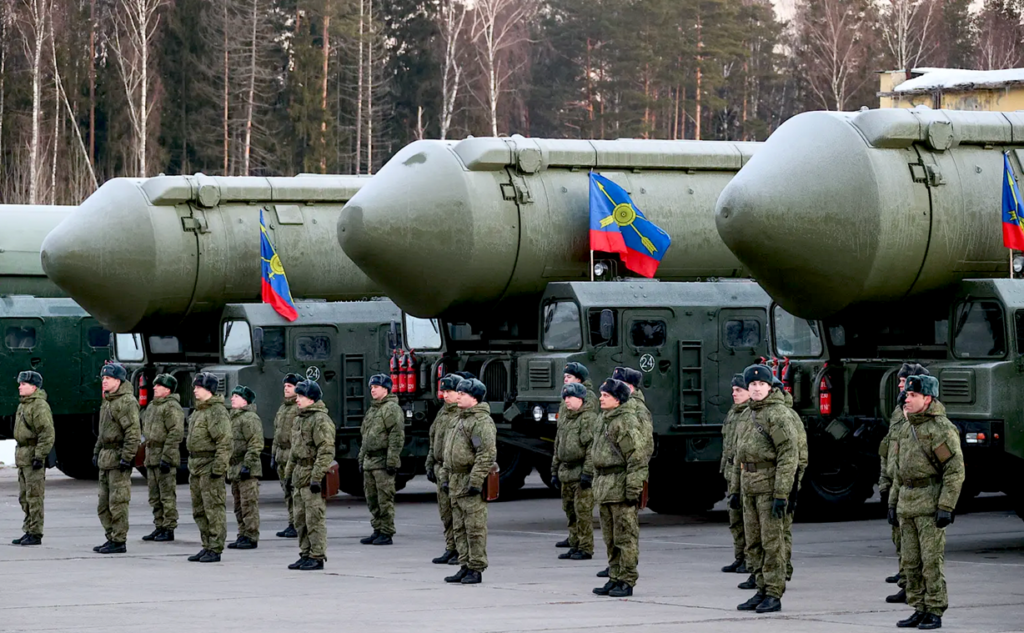
| “I WANT” NEVER GETS
I can remember grown-ups saying that in response to children’s demands. And the expression could well apply to Putin. He seems not to be gaining much through his
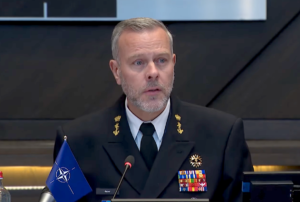
kleptocracy, however. His troops seized the Ukrainian village of Krokhmalne, in the Kharkiv region, but it only had a population of 45, which means it’s not much of an achievement, even if Ukrainian forces withdrew from the area, and Ukrainian military sources say that Russia is losing ordnance ten times as fast as Ukraine. Meanwhile, Russian soldiers’ wives have been staging protests outside Putin’s campaign headquarters, demanding the return of their husbands, although it’s rumoured that Putin plans to conscript more men to boost his fight. If his aim is really to be recorded in Russian history as a great man, he has partly succeeded: he will undoubtedly be remembered, but probably not as a great man.
Russia can boast some 1.33-million active military personnel and 5,977 nuclear weapons, a number almost equalled by combining those of the United States, France and the United Kingdom, but Russia can only boast a very few more than 4,000 military aircraft, compared with NATO’s 20,633. NATO has a lot more warships, too. The Foreign Affairs commentator for Britain’s Guardian newspaper, Simon Tisdall, quipped in 2023 that “Russia’s blundering army” couldn’t defeat “Ukraine’s 2nd XI” even when sober and “with the wind behind it”. There must be a lot of people in Kyiv who hope that he was right. Tisdall also wrote that a Russia-NATO conflict would be, for Putin, “political and military suicide.” Of course, he may be gambling on the fact that in any war the final outcome is uncertain until the last soldier has given in and the last bullet is fired (probably at the last soldier).
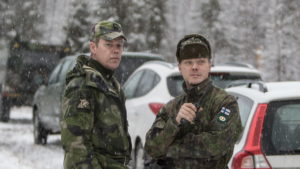
The Swedish neighbourhood is a distinct border area between Russia and the West.The Baltic Sea Region is of significance to European security and Russia is clearly seeking to increase influence over what it considers as its area of interest, including at least parts of Sweden’s neighbourhood.
Meanwhile, Russia, now with very few friends, seems to be attempting to intensify its relations with North Korea, another relatively unpopular country on the global scene. But for isolated Russia, North Korea is an important ally. The head of Ukraine’s military intelligence bureau, the GUR, is Kyrylo Budanov, who told the media that Pyongyang had provided Russia with large quantities of artillery shells, which could be vital for Russia. It is known to have been experiencing shortages. In fact, the deputy head of the GUR reckoned that North Korea had delivered one million rounds of artillery ammunition to Russia from September to November 2023. Apart from money, we are left to wonder what’s the advantage of such a deal for North Korea. In today’s world, nobody does anything for nothing.
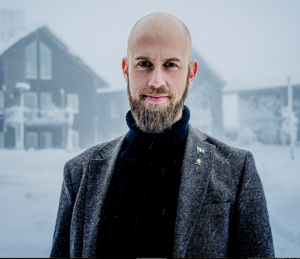
Of course, there remains the risk that Putin may turn his weapons on a NATO country, however suicidal that may turn out to be. Germany’s defence minister, Boris Pistorius, believes it’s a possibility and that it could happen within the next decade, albeit not immediately. Meanwhile, the issue of Ukraine’s continuing demand for ordnance is putting a strain on its allies. At the height of Ukraine’s counter-offensive in the summer of 2023, it was getting through around 7,000 shells every day, which is more than the Russians were using, but that has changed. Ukraine is now using around 2,000 shells each day, while Russia fires five times as many. The European Union would, for the most part, very much like to make up the shortfall, but Viktor Orban, Hungary’s Russia-loving leader, has vetoed the idea. He is a permanent fan of Putin, it seems. EU member states, unaffected by the veto, are doing their best individually to maintain a flow of armaments, but it’s not the same. Putin must be rubbing his hands with glee. Much of the problem stems from a long-running dispute over the rights of an ethnic Hungarian minority currently resident in the western Ukrainian region of Zakarpattia, even though both countries maintain embassies in each other’s country, along with sizeable minority populations. In the case of Hungarian nationals living in Ukraine, it’s not a very small minority; there are around 150,000 of them. What’s more, if Trump wins the next Presidential election in the US, the war may end quite suddenly and soon. Guess who the winner may be? The world has seldom faced a more uncertain future. Could that be what’s driving the race to put humans on the Moon again? It may be the last peaceful place in the Solar System.

